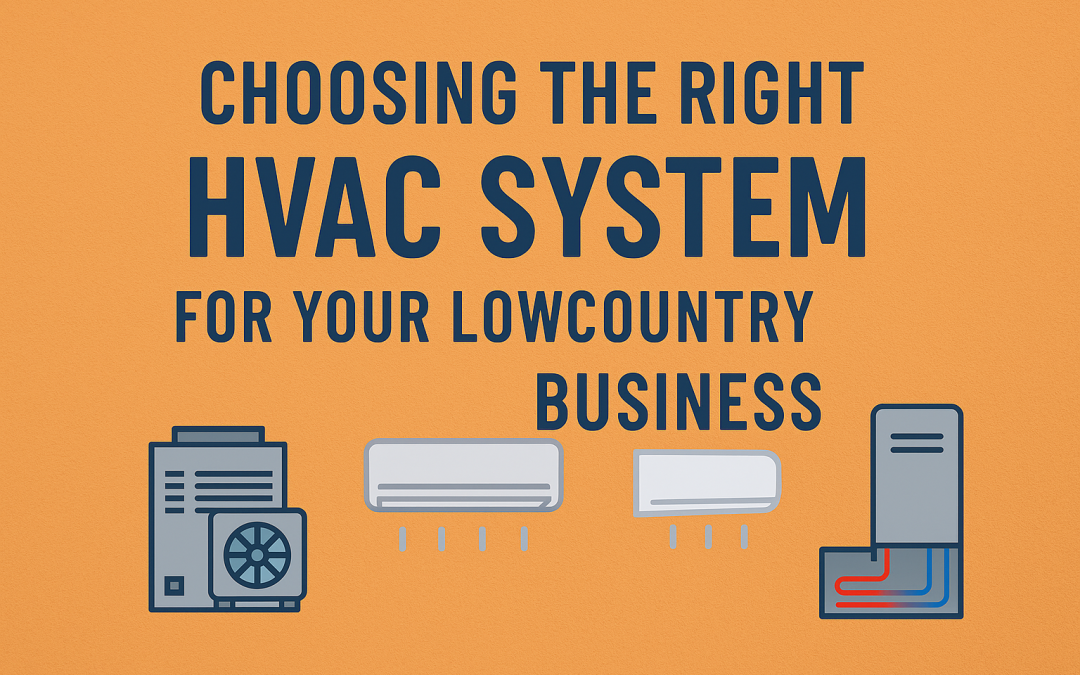Running a business in the Lowcountry means managing more than just day-to-day operations—you also need to provide reliable comfort for employees, customers, and tenants. With our hot, humid summers and salty coastal air, the right HVAC system is critical to energy efficiency, equipment longevity, and indoor air quality.
At Brian’s Mechanical, we specialize in commercial HVAC solutions designed specifically for the Lowcountry’s climate. Here’s what you should consider when choosing the best system for your commercial property.
The Climate Challenge: Lowcountry Conditions
From Charleston and North Charleston to Summerville and Beaufort, commercial buildings face:
- Intense heat and humidity from spring through fall
- Salt air corrosion near coastal zones
- Moisture-related indoor air issues
- Extended cooling demands that stress underpowered systems
Whether you operate a retail center, office complex, or restaurant, you need a system that can take the heat—literally.
Best HVAC Options for Commercial Properties
1. Packaged Rooftop Units (RTUs)
A popular choice for commercial buildings, combining heating and cooling in a single rooftop system.
- Ideal for: Flat-roofed buildings like retail stores and small offices
- Pros: Easy maintenance access, scalable, reliable
- Bonus: We install corrosion-resistant RTUs for coastal buildings
2. Split Systems
Indoor air handler + outdoor condenser = a simple and effective HVAC solution.
- Ideal for: Smaller commercial spaces with ductwork
- Pros: Cost-effective, good for open offices and workshops
3. VRF Systems (Variable Refrigerant Flow)
These high-performance systems provide zoned comfort using refrigerant as the heating and cooling medium.
- Ideal for: Multi-tenant buildings, hotels, medical clinics
- Pros: Energy-efficient, allows different zones to operate independently
4. Chiller-Based Systems
Large-scale HVAC designed for buildings with significant cooling demands.
- Ideal for: Hospitals, event centers, or campuses
- Pros: Powerful and reliable, but requires space and specialized service
5. Geothermal Systems
Eco-friendly and efficient, geothermal systems can significantly reduce operating costs.
- Ideal for: Long-term investments and new construction
- Pros: Low operational cost, long lifespan
- Cons: Higher upfront cost
Features That Matter in the Lowcountry
- Coastal Durability: Salt-resistant components are a must, especially within 20 miles of the coast.
- Humidity Control: Avoid mold, discomfort, and equipment wear with systems designed to control moisture year-round.
- High Efficiency: Look for ENERGY STAR-rated commercial units with smart zoning, variable speed motors, and integrated building automation.
- Air Quality Management: Indoor air quality is more important than ever. We offer filtration, UV systems, and humidity management tailored to your needs.
Correct Sizing = Comfort + Cost Savings
Oversized units lead to wasted energy and poor humidity control. Undersized units will burn out trying to keep up. At Brian’s Mechanical, we use Manual N commercial load calculations to ensure your system is the right fit for your building and your business operations.
Maintenance Plans Designed for Businesses
A commercial HVAC breakdown isn’t just inconvenient—it can cost you business. We offer proactive service agreements to help you:
- Avoid costly repairs
- Extend system lifespan
- Ensure consistent comfort
- Stay compliant with local codes
Work with Lowcountry HVAC Experts
Choosing the right system isn’t just about specs—it’s about understanding your building, your operations, and your environment. At Brian’s Mechanical, we’ve helped hundreds of commercial property owners in Charleston, Dorchester, and Berkeley counties get the right HVAC solution, installed the right way.Let’s talk about your project.
Whether it’s a system upgrade or new construction, contact Brian’s Mechanical today for a no-obligation site evaluation. We’ll help you protect your investment, reduce energy costs, and ensure your building stays comfortable – season after season.



